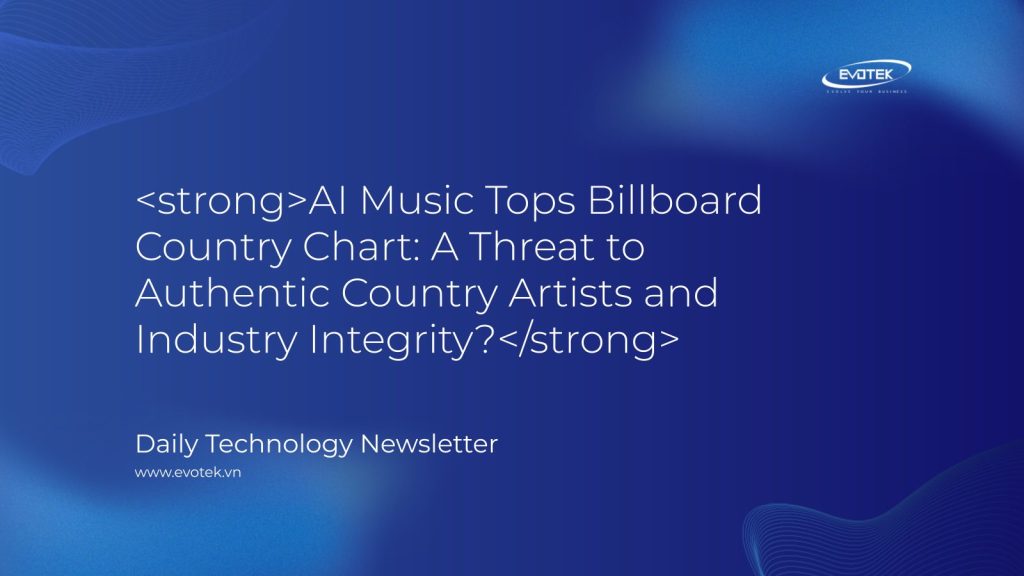The landscape of country music, traditionally built on heartfelt stories and genuine artistry, is facing an unprecedented challenge. An AI-generated song has not only made its way onto a Billboard country chart but has soared to the very top, sparking significant debate and concern among artists, industry insiders, and fans alike.
The Inevitable Rise of AI in Music
For the past few years, the rapid advancement of AI-generated music has been undeniable, particularly across platforms like TikTok. With increasingly sophisticated technology, many of these AI tracks are becoming difficult to distinguish from human-created compositions. This development presents a clear risk to the livelihoods of authentic artists, dedicated songwriters, and listeners who cherish real, human-made art over algorithmic output.
Numerous artists have vocalized their opposition to AI-generated songs that attempt to mimic their unique voices, leading some regions, like Tennessee, to enact legislation aimed at preventing such “deep fakes.” However, when it comes to entirely original music created by AI, the regulatory landscape remains largely unaddressed, suggesting a continued surge in this trend.
“Breaking Rust” Breaks Through: An AI-Generated Billboard #1
The most recent and alarming manifestation of this trend is “Walk My Walk” by an artist credited as “Breaking Rust,” which has astonishingly claimed the #1 spot on this week’s Billboard Country Digital Song Sales chart. While the name “Breaking Rust” might sound like a new outlaw country sensation, it is, in fact, an AI creation. The song is attributed to Aubierre Rivaldo Taylor, also behind “Defbeatsai,” another AI “artist” known for its algorithmically produced tracks.
While Defbeatsai’s Instagram page transparently discloses its AI nature, Breaking Rust’s social media presence omits any mention of machine involvement, simply labeling its genre as “Outlaw Country” and “Soul Music for Us.” This lack of disclosure raises questions about transparency and misrepresentation in the digital music space.
Billboard’s Role and the Legitimacy Question
The confirmation that Breaking Rust is indeed AI-generated came directly from Billboard itself, in a recent article acknowledging the presence of AI artists on its various charts. This admission, however, comes without any apparent policy or strategy from Billboard to differentiate AI-created content from music produced by living, breathing artists.
The numbers associated with Breaking Rust are stark: over 30,000 Instagram followers since October 15th, and a staggering 1.8 million monthly listeners on Spotify. To put this into perspective, acclaimed artists like Colby Acuff, who pours his heart and soul into his craft, registers just over a million monthly listeners. Charley Crockett, known for his prolific release schedule, hovers around 1.4 million. The notion that “AI slop” could surpass the listenership of such genuine talents is, for many, deeply infuriating.
The Erosion of Artistic Value and Financial Impact
The issue extends beyond mere chart positions. While computers have long played a role in music production—especially in genres like EDM, where human artists meticulously mix and create—AI-generated songs fundamentally differ. They are outputs of algorithms, devoid of the human ingenuity, emotion, and lived experience that define true artistry.
More critically, these AI tracks directly siphon attention and revenue away from human artists and songwriters. For instance, Ella Langley’s latest single, “Choosin’ Texas,” sits at #2 on the Billboard Country Digital Song Sales chart, a position that would have been hers were it not for an AI contender. This scenario suggests a potential for AI content to be bolstered by artificial means, such as fake streams or followers, though concrete evidence remains elusive.
This problem isn’t confined to country music. Billboard has identified at least six AI or AI-assisted artists on its charts in recent months, acknowledging that the true number could be higher due to the increasing difficulty in detecting AI-generated content. Yet, there seems to be no immediate plan from the publication to address this growing trend or to implement policies that distinguish genuine human artistry.
A Call to Action for Artists and Fans
If the music industry continues to reward AI creations on its most influential charts, the incentive for real artists to pursue the arduous path of traditional music creation diminishes significantly. We risk hurtling towards a future where streaming platforms and charts prioritize rapidly churned-out AI content over the profound, soul-stirring works of human beings.
The inherent lack of heart, soul, lyrical depth, and musical intricacy in AI-generated music is palpable. Yet, as long as it garners streams and chart recognition, there’s little reason for its creators to cease production. This development ultimately penalizes artists and loyal fans. Streaming platforms may see AI streams as revenue, and it might not be long before major labels begin to promote their own AI “artists” for similar financial gain.
It is imperative that we resist the normalization and incentivization of lazy, AI-generated content over the authentic, handcrafted music of human artists. Billboard’s current approach to charting AI songs appears to be inadvertently accelerating us toward a point of no return for the integrity of the music industry.

 日本語
日本語 한국어
한국어 Tiếng Việt
Tiếng Việt 简体中文
简体中文